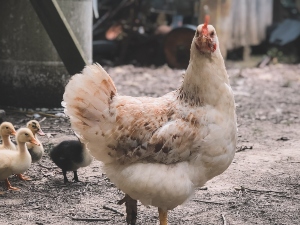
Corn is a delicious treat not only for humans but for chickens too. It is not only eaten by the human population but it is also used as the main ingredient that gives energy in livestock feed.
If you’re looking to feed your chickens corn you may be wondering which is best, cracked corn vs while corn for chickens. This article will help you figure that out
Chickens prefer whole corn over cracked corn. They love to eat any type of corn regardless of how it’s served but prefer whole corn. Chickens enjoy and benefit from whole corn being scattered around as they can scratch and peck for it. They don’t have to peck for whole corn too much but they will have to peck a lot in the case of cracked corn.
Table of Contents
Cracked corn vs whole corn for chickens
Corn is one of the favorite foods of chickens everywhere. When it comes to comparing cracked and whole corn chicks prefer whole corn. Moreover, if the corn is on a cob then they’ll have a fun time pecking at it at well.
If its whole corn is scattered around their feeding area it becomes more enjoyable to eat it as they scratch and peck for it which comes naturally to them.
Corn, in general, has good nutritional benefits for chickens. It has protein, fiber, oils, and sugars to grant energy, and warmth and is filling.
Cracked corn is just as good, though the smaller sizes mean more pecking for chickens. If you have smaller backyard birds then they will prefer corn processed through a coarse grinder.
At what age can you feed chickens cracked corn?
Ideally, chickens between 3 to four weeks old can have cracked corn. Whole corn is great for mature and older chickens, but it can be a challenge for and be a choking hazard to smaller baby chicks.
Cracked corn on the other hand is easier to eat for baby chicks given its smaller size. If you can crack your corn baby chickens can easily swallow the corn without it being a risk.
How do I make cracked corn for chickens?
What you’ll need is a grinder to crack or split the corn into smaller bits.
Once you have set up your grinder and placed a container to catch the cracked corn then you can start adding the whole kernels of shelled dried corn into the grinder.
You then need to grind it until you have cracked the corn to your desired size and amount.
FAQ:
Can chickens eat cracked corn every day?
While chickens would survive on cracked corn every day this food should not be the only thing you feed to your bird on a daily basis.
This food has a good amount of nutrients but it is lacking in a variety of nutrients that the bird needs to maintain good health
Can I mix cracked corn with chicken feed?
Yes, if you are looking to add some cracked corn to your chicken feed then you can do so, that being said, it should be done in moderation.
This food is a carbohydrate and has nutrients but a complete nutritional feed should make up the bulk of the mixture
Is too much corn bad for chickens?
Corn is a great food for chickens but it has its cons. Too much of anything, even a good thing, can be damaging even if it’s a great and healthy food.
Corn is rich in fibres, unfortunately too much can dry up the chicken’s internal moisture if the animal does not drink enough water on a regular basis.
Also, the high content of oils in corn can quickly bulk up the chicken and turn it into a very fat bird. This can be bad because overweight chickens are lazy, and prone to illnesses.
If that wasn’t enough, the high carbohydrate levels in corn cause high energy release which brings added heat to the body of chickens.
If the temperatures are already hot outside, then the added heat from its own body will be unbearable for the chicken.
Therefore, too much corn is a no go.
How much corn should I feed my chickens?
Having a feeding plan in place is a great way to feed corn to chickens. Ideally feeding them as little as around 15% to 16% corn in their daily diet is a good ratio.
That’s about half a handful of corn per chicken per day. This will maintain healthy levels of minerals while not having a negative effect on the chicken’s nutrition.
Conclusion
In conclusion, whole corn is the better for thickens, chickens like to peck at corn scattered around, whole corn is small enough for them to peck at and is larger than cracked corn making it not too tedious to peck at.
Cracked corn is better suited for smaller birds and chicks. You can make cracked corn by grinding it up in a grinder. That being said, too much corn can be bad for chickens so stick to feeding them half a handful per chicken per day.
If you enjoyed this article then you may also be interested in other chicken related articles. Here are some articles that you may be interested in: Where do chickens live in the wild? Do chickens eat maggots? How do farmers know if a chicken egg is fertilized? Frozen corn for chickens, beneficial or not?

